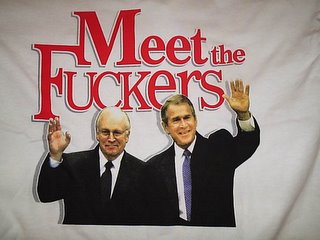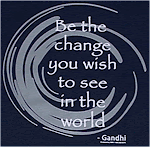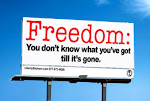 After reading and posting "The Magical Victory Tour" I just had to post this picture again. My New Years Resolution is to IMPEACH these 2 "FUCKERS"
After reading and posting "The Magical Victory Tour" I just had to post this picture again. My New Years Resolution is to IMPEACH these 2 "FUCKERS"HAPPY NEW YEAR !!!!!!!!!!!!!!!!.............PEACE.................Scott
Welcome to the Conservative Revolutionary American Party's BLOG. Conservative in that we believe in the Constitution of the U.S.A. We are Revolutionary in the way that our founding fathers were in throwing off the bonds of tyranny. We are American in that we are guided by Native American Spirituality; we ARE responsible for the next 7 generations. We are a Party of like minds coming together for a common cause. This BLOG is a clearing house of information and ideas. PEACE…………Scott




















By William Greider
The Nation
The tragedy of
The levee metaphor, vividly dramatized by the
Events, nevertheless, have delivered a teachable moment-an opportunity to reframe and reargue many long-neglected matters. The wheels are coming off the right-wing bus. The President of Oil and War is no longer much believed. The vast suffering and physical destruction in
Oceans are warming, the Arctic ice cap is shrinking. The deep topsoil of
Should we blame the farmers? The oil and chemical companies? The teenagers who love their gadgets? The politics of blame-and-shame was brilliantly perfected thirty years ago by the environmental movement but gradually lost its effectiveness, partly because it framed the contest as a righteous struggle between good guys and bad guys-virtuous citizens versus dirty industrial polluters (and often their workers). It felt good to identify the culprits, but moral indignation eventually loses its power to enforce. Plus, the enormity of what we face is too all-encompassing. Not many of us can truly claim innocence.
The predicament is fundamental and universal: It is the collision between industrial society and nature. Politicians and environmental activists can be forgiven for not wishing to take on the "American way of life," but essentially that is what's required. Eliminating this collision, before it destroys the very basis of modern prosperity and life itself, calls for nothing less than the transformation of the American industrial system and mass-consumption economy. Among other things, it means reinventing the processes of production and redesigning virtually every product. It means taking responsibility for what we make and consume-recovering what is now discarded in landfills, dumped in rivers or vaporized in air and atmosphere. It means remanufacturing components and materials into new products.
Daunting and radical as that all might sound, the good news is that these great changes are technologically feasible. The transformation will take decades, even generations, to complete, but industrial experts affirm that it is doable. Starting promptly on this historic commitment will avoid (or at least mitigate) the larger catastrophes ahead.
The real obstacle is political, not scientific, because reform depends on the choices society makes (or fails to make). Who is the "we" responsible for these choices? One way or another, it is all of us. Virtually every institution of capitalism-manufacturers and merchants and, above all, the financiers who discipline them-will be compelled to alter routine functions in deep ways. But so will consumers and workers. As with other aspects of American life, the burden will not fall evenly on every citizen. Sacrifices and disruptions are typically maldistributed downward on the ladder of income and status. The goals of environmentalism often sound preciously elitist because the most severe costs usually fall on the working class or poor, people with limited margins. Not surprisingly, they sometimes resist.
It will be essential to recognize that inequality is an ecological issue. If this sweeping transformation proceeds, the impact on work, wages and living standards has to be a central component of the reform agenda-not just necessary for political support but also to insure that a healthier society emerges from the deep changes. In fact, the logical promise of industrial transformation is that it will lead to better lives for all-improved circumstances and health, greater economic security and brighter prospects for the future. Every ordinary American wants that, and every ordinary American is entitled to expect it.
Making it happen requires a new progressive perspective that fuses the ecological imperative with economic outcomes. We need a synthesis that replaces fear with hope-not as rhetoric but bolstered with proof that this goal is attainable for all. Inventive minds are already working on it.
The Apollo Alliance offers one positive model for reshaping the future. It started from the premise that American politics will not undertake a serious agenda on global warming and alternative energy sources until labor groups and environmentalists come together on the objective. "When Apollo started, political progress on energy was mired in the jobs-versus-environment debate," says Jeff Rickert, Apollo's acting executive director. "In order to break that deadlock, we proposed a new way of thinking-a plan that removed the wedge between environmentalists and labor unions by focusing on the job-creating aspects of a clean-energy investment policy."
Packaged and tested with rigorous economic analysis, the Apollo proposal calls for a ten-year, $300 billion investment agenda-federal financing to foster development of alternative fuels, innovative eco firms and energy-conserving reforms in housing, green building codes, transportation and other realms. These investments, analysts estimate, would generate 3.3 million new jobs. One strategist noted a resemblance to John F. Kennedy's moon-landing initiative in the 1960s-an endeavor that also created high-wage skilled jobs and new tech sectors. Overcoming the ecological threat could become this generation's Apollo project. Hence the name.
The public capital would be invested-some directly, some as subsidy incentives-in new fuels (solar, hydrogen, biomass, wind); in high-efficiency vehicles as a transition to post-petroleum transportation; in rebuilding urban infrastructure for "smart growth"; in rapid transit and regional rail networks like the high-speed Maglev trains; and in a modernized electrical system that reduces carbon emissions and increases efficient transmission. These and other ventures, Apollo analysts estimate, would generate $1.4 trillion in GDP gain for the
As an organizing device, the Apollo concept has worked brilliantly. Some twenty-one labor unions and the AFL-CIO, nineteen environmental organizations and fifty-eight business leaders have signed on, along with civil rights and equal-justice groups that recognize that retrofitting buildings and other projects can bring good jobs back to inner cities. Nine "Apollo governors" are pushing variations on the concept as state legislation. In
"We have a lot of examples where we have gotten rid of the wedge, a few cases where we failed," Rickert said. "It's still the beginning, but I think we've gotten past the toughest patch." In one notable example, the United Mine Workers Union, whose coal miners are the most directly threatened by climate-change reform, has officially acknowledged that global warming must be addressed. That might seem like a small step, but it puts the UMW out in front of ExxonMobil.
Meanwhile, a new coalition of Christian conservatives-Set
While our government remains indifferent, the European Union has launched a coherent, long-term strategy for industrial transformation-nothing less. The EU is forcing industry, sector by sector, to undertake the redesign of products, production processes and packaging. These industries have resisted the specific costs, of course, but they do not argue with the goal or complain about "bad science."
Starting next year, European auto manufacturers will be required to "take back" their old vehicles and recover 85 percent of the content, reformulating the materials for use in new cars or other products. Consumer electronics, computers and cell phones are next in line. This program leaps far beyond the recycling of old newspapers or bottles familiar to American consumers, because the Europeans put the ecological responsibility directly on the manufacturers, not individual consumers. Forced to recover value from their discarded consumer goods, companies will have a strong incentive to design the toxics out of their products and to make them easier to disassemble and remanufacture.
Ford and General Motors will have to comply with the EU rules, since they make cars in
Even so, the struggle for industrial transformation advances here on many fronts. Activist campaigns are encouraging American companies and sectors to adopt higher ecological standards in their products and purchasing, covering everything from wood to hamburgers. Other efforts are developing enterprises that embrace the new values.
The concept of take-back laws is slowly gaining traction at the state level for consumer electronics and packaging, though not yet for cars. Local governments, which bear the financial burden of waste disposal, are beginning to think seriously about shifting some of the cost to manufacturers, through fees or taxes on sales-giving companies a strong reason to produce less waste in the first place. Xerox and other industry leaders are developing take-back and reuse programs, anticipating the legal responsibility that will someday be the standard. The ultimate goal is producing waste-free products.
California-first in the nation as usual-has enacted a take-back law for computer monitors and television sets; the customer pays a fee of about $10 up front, financing the eventual recycling and recovery costs when these items are discarded.
A potential breakthrough exists in a consortium of legislators from ten Northeastern states. The consortium members are developing a model state law based on the
When industrial transformation does finally come to our shores, Americans will discover a wonderful wrinkle-it creates jobs, many millions of them. The consuming public will be more enthusiastic about serious reform once folks recognize that industrial reordering delivers good jobs with good wages for Americans-not more bucket-shop employment that exploits workers.
If the
15 December Issue
While Iraq burns, the president keeps playing the same old song.
December 7th, 10:44 a.m., the sixty-fourth anniversary of Pearl Harbor day. I've just woken up with a line of drool on my face in the back row of a ballroom at the Omni Shoreham Hotel in Washington, D.C., where any minute now President George W. Bush will give the second address of his barnburning four-speech "National Strategy for Victory in Iraq" tour.
There are no T-shirts for this concert tour, but if there were, the venue list on the back would make for one of the weirder souvenirs in rock & roll history. U.S. Naval Academy in Annapolis, Maryland, November 30th, no advance publicity, closed audience: check. Here at the Omni, December 7th, again no advance warning, handpicked audience, ten reporters max (no one else knew about it), with even the cashiers in the hotel's coffee shop unaware of the president's presence: check. Dates three and four, venues and dates unknown for security reasons: check and check.
This is how President Bush takes his message to the people these days: in furtive sneak-attack addresses to closed audiences of elite friendlies at weird early-morning hours. If you want to catch Bush's act in person during this tour, you have to stalk him for days and keep both ears open for last-minute changes of plan; I actually missed the Annapolis speech when I made the mistake of briefly taking my eye off him the day before.
Here at the Omni I showed up early, determined not to repeat my mistake. I was not going to miss the National Strategy for Victory in Iraq, no sir. But for all my preparations, I did almost screw it up again. I fell asleep an hour before the event and only awoke in the middle of the introductory remarks by Richard N. Haass, the president of the Council on Foreign Relations, the stodgy, status-quo think tank hosting the event. I pried my eyes open just in time to see Bush, looking spooked and shrunken, take the stage.
Bush in person always strikes me as the kind of guy who would ask a woman for a hand job at the end of a first date. He has days where he looks like she said yes, and days where the answer was no.
Today was one of his no days. He frowned, looking wronged, and grabbed the microphone. I pulled out my notebook . . .
A few minutes later, I felt like a hooker who's just blinked under a blanket with a prep-school virgin. Was that it? Is it over? It seemed to be; Bush was off the podium and slipping down the first line of the crowd, pumping hands for a minute and then promptly Snagglepussing toward the left exit. By the time I made it five rows into the crowd, he had vanished into a sea of Secret Servicemen, who whisked him away, presumably to return him posthaste to his formaldehyde tank.
I looked down at my notes. They indicated that Bush had opened his remarks by comparing the Iraq War to World War II ("We liberated millions, we aided the rise of democracy in Europe and Asia. . . . "). From there we learned that we were fighting an enemy without conscience, but all was not lost, because the entrepreneurial spirit is alive and well in Iraq. Of course there had been setbacks, because in the past after we took a city, we left it and the terrorists would just take it back again. But we've stopped doing that now and so things are better. In conclusion, Sen. Joe Lieberman visited Iraq four times in the past seventeen months and, goddamn it, he liked what he saw.
In the Obey Your Thirst/Image Is Everything era of American politics, Bush's National Victory campaign is a creepy innovation. It features the president thumping a document - the "National Strategy for Victory in Iraq" - that was largely written not by diplomats or generals but by a pair of academics from Duke University named Peter Feaver and Christopher Gelpi. Essentially a PR document, the paper is basically a living political experiment, designed to prove that Americans will more readily accept military casualties if the word "victory" is repeated a great many times in public.
"This is not really a strategy document from the Pentagon about fighting the insurgency," Gelpi told The New York Times. "The document is clearly targeted at American public opinion."
In other words, this was really a National Strategy for Victory at Home. It was classic Bush-think: Instead of bombing the insurgency off the map, he bombs the map - in lieu of actually fighting the war, a bold strategy, to be sure. But would it work?
Both the record and my notes indicate that the audience applauded on two occasions. The first came after the line "And now the terrorists think they can make America run in Iraq, and that is not going to happen so long as I'm the commander in chief." My notes say, "Scattered but by no means unanimous applause." The second time came at the end of the speech, after the last line, "May God continue to bless our country." This time the reaction was more enthusiastic, but at least one person - me - was clapping because it was over.
The Council on Foreign Relations was good enough to pass out a list of the expected attendees at the speech. Here are some of the names that one could find in Bush's audience: Frank Finelli, the Carlyle Group; Adam Fromm, Office of Rep. Dennis Hastert; Robert W. Haines, Exxon Mobil Corp.; Paul W. Butler, Akin Gump Strauss Hauer and Feld LLP; Robert Bremer, Lockheed Martin Corp.; Scott Sendek, Eli Lilly and Co.; James H. Lambright, Export-Import Bank of the United States.
The point is obvious; Bush's audience was like a guest list for a Monster's Ball of the military-industrial establishment. And even in this crowd full of corporate lawyers, investment bankers, weapons makers, ex-spooks and, for Christ's sake, lobbyists, the president of the United States couldn't cook up more than two tepid applause lines for his Iraq policy - and one of those was because he was finishing up and, one guesses, freeing the audience to go call their brokers.
God bless George Bush. The Middle East is in flames, and how does he answer the call? He rolls up to the side entrance of a four-star Washington hotel, slips unobserved into a select gathering of the richest fatheads in his dad's Rolodex, spends a few tortured minutes exposing his half-assed policies like a campus flasher and then ducks back into his rabbit hole while he waits for his next speech to be written by paid liars.
If that isn't leadership, what is?
Not many people in the Omni audience hung around to be interviewed when it was over. The few who did make themselves available tried to put a brave face on the situation.
"Well, he did the best he could under, uh, difficult circumstances," said council member Jeffrey Pryce.
Did he detect anything new in the new strategy?
"No," he said, shrugging. "But he's in a tough spot."
I'd been following the national tour for more than a week. If the reception at the Omni was stale, that was nothing compared to how it was going over in the White House briefing room. On the day before the Omni speech, I actually worried that gopher-faced administration spokescreature Scott McClellan might be physically attacked by reporters, who appeared ready to give official notice of having had Enough of This Bullshit.
In fact the room at one point seemed on the verge of a Blazing Saddles-style chair-throwing brawl when McClellan refused to answer the cheeky question of why, if we weren't planning on torturing war-on-terror detainees in foreign prisons, we couldn't just bring them back to be incarcerated in the United States.
"I think the American people understand," McClellan said, "the importance of protecting sources and methods, and not compromising ongoing efforts in the war on terrorism . . ."
When a contingent of audibly groaning reporters pressed, McClellan shrugged and tried a new tack: "I'm not going to talk further about intelligence matters of this nature," he said.
A reporter next to me threw his head back in disgust. "Oh, fuckin' A . . ." he whispered. The room broke out into hoots and howls; even the usually dignified Bill Plante of CBS started openly calling McClellan out. "The question you're currently evading is not about an intelligence matter," he hissed.
I looked around. "Man," I thought. "This place sure looks better on television." On TV, the whole package - the deep-blue curtains, the solemn great seal - suggests majesty, power, drama. For years I'd dreamed of coming here, the Graceland of politics.
But in real life the White House briefing room is a grimy little closet that's peeling and cracking in every corner and looks like it hasn't seen a bottle of Windex in ten years. The first chair in the fifth row is broken; the fold-up seat doesn't fold up and in fact dangles on its hinge, so that you'd slide off if you tried to sit on it. No science exists that could determine the original color of these hideous carpets. Reporters throw their coats and coffee cups wherever; the place is a fucking sty.
It's a raggedy-ass old stage, and the act that plays on it isn't getting any fresher, either. All partisan sniping aside, this latest counteroffensive from the White House says just about everything you need to know about George Bush and the men who work for him.
Up until now this president's solution to everything has been to stare into the cameras, lie and keep on lying until such time as the political problem disappears. And now, unable to comprehend that while political crises may wilt in the face of such tactics, real crises do not, he and his team are responding to this first serious feet-to-the-fire Iraq emergency in the same way they always have - with a fusillade of silly, easily disprovable bullshit. Bush and his mouthpieces continue to try to obfuscate and cloud the issue of why we're in Iraq, and they do so not only selectively but constantly, compulsively, like mental patients who can't stop jacking off in public. They don't know the difference between a real problem and a political problem, because to them, there is no difference. What could possibly be worse than bad poll numbers?
On this particular day in the briefing room, it's just more of the same disease. McClellan, a cringing yes-man type who tries to soften the effect of his non- answers by projecting an air of being just as out of the loop as you are, starts pimping lies and crap the moment he enters the room. He's the cheapest kind of political hack, a greedy little bum making a living by throwing his hat on the ground and juggling lemons for pennies.
Putting his hat out for the Strategy for Victory, he says nothing new - there is no real strategy, remember, just words - and it quickly becomes clear that the whole purpose of this campaign is not to offer new information but to reinforce the administration's most shameless and irresponsible myths about the war: that we invaded to liberate Iraq, that Saddam Hussein was behind 9/11, and so on. McClellan does this even in the context of responding to angry denunciations of this very tactic.
For instance, when a reporter asked why the administration still insists on giving the impression that Saddam Hussein was behind the 9/11 attacks, McClellan answered, "I don't think that [it] does. But I think what you have to understand about September 11th is that September 11th taught us some important lessons: one, that we need to take the fight to the enemy and engage them abroad . . ."
Implying, in other words, that the enemy who attacked us was in Iraq. Same old shit.
After hearing McClellan talk for what seemed like the thirtieth time about our continuing efforts to spread democracy, I finally felt insulted. Giving in to the same basic instinct that leads people to buy lottery tickets, I raised my hand. I figured I'd ask nicely, just give him a chance to come clean. C'mon, man, we know you're lying, why not just leave it alone? I asked him if he couldn't just admit, once and for all, that we didn't go to Iraq to spread democracy, that maybe it was time to retire that line, at least.
"Well," he said, "we set out the reasons we went to Iraq, and I would encourage you to go back and look at that. We have liberated 25 million people in Iraq and 25 million people in Afghanistan . . ."
"But that wasn't the reason we went -"
"Spreading freedom and democracy," he said, ignoring me. "Well, we're not going to re-litigate why we went into Iraq. We've made very clear what the reasons were. And no, I don't think you define them accurately by being so selective in the question . . . that's important for spreading hope and opportunity in the broader Middle East . . ."
"Just to be clear," I said, exasperated, "that's a different argument than was made to the American people before the war."
"Our arguments are very public," he said. "You can go look at what the arguments are. That's not what I was talking about."
He smiled at me. There's your strategy for victory in Iraq: Fuck all of you - we're sticking to our story.
By Tom O'Brien
The
After a long time away, you see with new eyes.
I moved back to the
Nowhere has this been put in sharper relief than in the story of two colleagues. Struck in March with cancer, an American colleague worried about death, insurance loss and bankruptcy. In contrast, a Canadian colleague and cancer victim had only her disease to fight.
Susan was on sick leave when I came to work at my new job in August. She was middle-aged and single with a grown family and well liked in my office. She was undergoing chemotherapy to treat breast cancer and not able to work. Our employer supported her beyond the normal period of sick days and vacation.
But the scary question for anyone but the rich hit with a catastrophic illness in the
In contrast, my former colleague Kathleen back in
I hear stories here about Canadians lining up for basic medical care. But despite plenty of doctor appointments, occasionally bringing my children to the ER, and having had a heart procedure myself, I didn't witness any delays for necessary (let alone emergency) care. In survey after survey, Canadians support public, nonprofit health care by a wide margin.
And why not? Compared to the
After 40 years of private health care in
Few Americans know that every other industrial country in the world has a health-care system more or less like
Our seniors like it. Sure, it will raise the cost of this government program by billions of dollars, according to even the most conservative estimates. But it will save money for both individuals and employers who now purchase private health insurance. After all, it's not how much of your income you pay, it's how much you keep. You'll keep more under Medicare-for-all, and every child, woman and man would get the timely health care they need.
Give people the opportunity to face and fight their illnesses, not their insurance companies.
Tom O'Brien joined the
'Best' Green Energy Schemes Named
BBC News
|
Ten new green energy projects have been named as "best" in the
The schemes, which began operation in 2005, were exciting and innovative, the Department of Trade and Industry said.
They include offshore turbines in
A target of supplying 10% of the
Energy minister Malcolm Wicks said: "The projects highlighted have certainly made their contribution to reducing carbon emissions and increasing the megawatt capacity that comes from green sources."
'Considerable Progress'
He said they had also helped people understand "what renewable energy is and where it comes from," and added it was essential for the
The list includes three wind farms, three solar-power projects, and two examples of microgeneration, or projects with lower outputs.
According to the government, the 30-turbine Kentish Flats wind farm has been described as "the Ferrari of the turbine world."
Black Law A in
The CIS tower in
And the biomass plant in
The wave buoy project off the north
The site is being investigated as a possible wave hub location - an offshore electrical socket that would be connected to the national grid.
Also Included in the List Are:
By Kelpie Wilson
t r u t h o u t | Review
Thin Ice: Unlocking the Secrets of Climate in the World's Highest Mountains
By Mark Bowen
Henry Holt, 2005
"In Sanskrit, Himalaya means 'abode of snow,' but as crops and people die from lack of water while watching the highest mountains on Earth turn from white to black, that name may soon seem grotesquely inappropriate."
-- Mark Bowen, Thin Ice
Climate shock comes from the realization that climate change is not only real, but huge; it is not only huge, but it is now; and it will affect your life very shortly. Not your grandchildren's lives. Not your children's lives. Your life. Soon - if it hasn't already.
If you have not experienced climate shock yet, you will when you read Thin Ice by Mark Bowen. Thin Ice is the story of the scientific team from
Thin Ice is an exciting adventure story. The logistics of transporting the scientists and their drilling equipment into the most inaccessible places on Earth bring hair-raising tales. The team members struggle with altitude sickness, windstorms destroy the solar panels that power their drill, crampons get stuck in ladders deployed over widening crevasses, and the crew tries to float ice core samples off the mountain with a hot-air balloon.
The scientists are awed by their surroundings as they camp for weeks at a time on the top of the world, absorbing "the brown earth and the blue sky and the white ice..." until it seeps into their skins and they bond emotionally with the mountains. Bowen quotes researcher Mary Davis saying that she has a "soft spot" for the Dunde Ice Cap in
The scientific detective work is just as thrilling. Thompson's team has made a number of surprising additions to climate theory and shaken some deeply held establishment views. One surprise was the discovery that a few of the mountain ice cores went as far back in time as any yet recovered from the polar regions. Why? Because when ice gets thick enough, as it does at the poles, pressure and temperature build up, and the ice actually starts to melt from the bottom, destroying the sediment layers and air bubbles that yield all the historical information. But tropical mountains have only scant annual precipitation, so the ice layers are thin, making a longer time-horizon possible. Hence the book's title, Thin Ice.
Another surprising result is some convincing evidence that the
Thompson's work shows that tropical influences, particularly the El Niño and monsoon cycles (which are related), are the bigger drivers of climate change. This suggests that in the future, the Earth's climate may resemble what we see in El Niño years, but much more extreme. Depending on where you are, your climate shock could show up as either flood or drought or both in rapid succession - a permanent El Niño from Hell.
My own climate shock came in 2002 when the 500,000-acre Biscuit Fire raged through the Kalmiopsis Wilderness in southwest
Trying to anticipate the climates of the future is impossible without understanding those of the past, yet as Bowen conveys in this book, the past is extremely complicated and hard for someone who is not a climate researcher to fully understand. Given the difficulties, Bowen does a remarkable job both of explaining it and keeping the story interesting and fast-paced. But for a little help getting a better grasp on Earth's history and the timescales involved, I turned to a 1991 book by scientist James Lovelock called Healing Gaia.
Lovelock believes that the best way to think about the Earth is to see it as an organism that goes through phases of sickness and health, or instability followed by equilibrium. Earth's medical history is a long story, for she is an older lady. Her life is now at least 3.5 billion years old.
Conditions change on Earth, and one is that the sun has grown hotter. For most of the age of mammals (the age that followed the dinosaurs and their asteroid demise) the Earth was warm and no ice formed at the poles. But as the sun grew ever hotter, by about 2 million years ago, polar ice caps formed and the Pleistocene began - the ice ages. This sounds odd, but Lovelock explains it: the Earth began to pull more CO2 out of the atmosphere and store it in rocks and plants. Less CO2 in the atmosphere lessened the greenhouse effect and temperatures dropped. But because of cyclical changes in Earth's orbit over time, the ice ages have see-sawed back and forth between glacial and interglacial in a series of 100,000-year cycles. A system with this much dynamism is prone to getting knocked off balance, and there is little doubt that that is what is happening now: climate shock.
A funny thing happened 2 million years ago on the way to the ice ages. The ice caps sucked moisture from the African forests, which withered and withdrew from the plains. An arboreal ape came down from the trees and began to make tools and lose its hair. When its descendants multiplied and started to burn fossil fuels, they became a fever-inducing planetary infection. They (we) are the cause of climate shock.
Thin Ice is really the story of the "planetary physicians," as Lovelock calls them - the scientists like Lonnie Thompson who have devoted their careers to taking the planet's temperature. And now the world is getting so warm that anyone can hold a hand to the patient's forehead and get a sense of what is happening.
Besides being a physics PhD from MIT, Thin Ice author Mark Bowen is also an avid recreational climber. He was able to add to his story of scientific discovery the eyewitness accounts from climbers all over the world of rapid ice-melting over the last ten years. A glacier that was a stone's throw from Sir Edmund Hilary's first camp on Mt. Everest has retreated three miles since Hilary's 1953 historic ascent.
An international commission predicts that there is a high likelihood that all of the Himalayan glaciers will melt by 2035. The Himalaya will turn black, and the Ganges and other rivers that flow from it will dry to seasonal streams. The 500 million people in India who depend on water from these rivers will have no other source. As mountain glaciers and snow packs melt everywhere, China, the Andes and California will face the same climate shock - no water.
Meanwhile, the melting ice will raise the seas. Lonnie Thompson and other researchers are discovering that once glaciers start to melt, they can melt all the way to bedrock very rapidly. If all of the Earth's mountain glaciers were to melt, it would raise the sea level by a foot and a half and that would be the end of places like Bangladesh and Louisiana's bayou country. But the polar ice caps are showing the same tendency for rapid melting, and a mere two degree Fahrenheit rise in global temperature could be enough to cause a complete disintegration. Sea levels could start rising by 3 feet every 20 years. We will have to act quickly and drastically to avert this inundation.
Reading Thin Ice and exposing yourself to climate shock could help prepare you for your new role in the greenhouse world. We will need more planetary physicians to diagnose and prescribe, and there will also be a need for planetary nurses, orderlies and volunteers to pitch in around the clock to keep the dear old lady alive. What does this mean? Probably it will mean changing everything about the way we live, starting by reducing our fossil fuel consumption now.
But how on Earth can we train ourselves to change everything, all at once?
Let's face it: We are more like monkeys than like gods, and we learn best by imitating whatever we think is admirable. For most of our evolutionary history we were a prey species - a scruffy primate just recently evolved from a rodent. And so, in our hominid phase we have fancied ourselves a glorious predator, in the same league with the lion and the eagle. In the future, if we want to survive, we will become symbionts - life forms that live in partnership with others. We may become like the rhinoceros bird that pecks parasitic ticks (and blood) from the rhino's back and warns it of approaching danger.
As successful symbionts we will adapt to the warmer Earth by living modestly and learning all the tricks and trades for storing carbon away in forests, fields, soils and rocks. We'll blow sweet breezes on the lady's brow, soothe her hot flashes, and cool the Earth again. In return, if luck and tides are with us, she will continue to sustain us until our time on Earth is done.
Kelpie Wilson is the t r u t h o u t environment editor. She is also a mechanical engineer and does technical writing for the solar power industry. She has been a leader in the campaign to protect ancient forests in the Pacific Northwest and was the executive director of the Siskiyou Regional Education Project. Her first novel, Primal Tears, has been published by North Atlantic Books.
|
Word of the Day for Saturday December 31, 2005
Hogmanay \hog-muh-NAY; HOG-muh-nay\, noun:
The name, in Scotland, for New Year's Eve, on which children
go about singing and asking for gifts; also, a gift, cake, or
treat given on New Year's Eve.
This is Hogmanay, the gifting of another year, the coming
of midnight, the darkest hour, before the turn towards
dawn.
--John F. Deane, "The music of what happens," [1]Irish
Times, December 28, 2000
The biggest celebration in Britain was in Edinburgh, where
Hogmanay drew about 200,000 people to a free street party
in the city centre.
--"Archbishop of Canterbury calls for greater generosity,"
[2]Irish Times, Saturday, January 2, 1999
_________________________________________________________
The origin of the word Hogmanay is unknown.
References
1. http://www.ireland.com/
2. http://www.ireland.com/